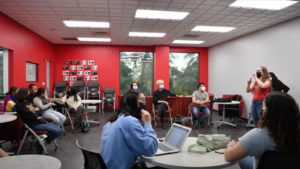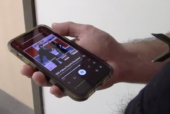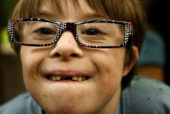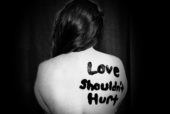The Deaf and Hard of Hearing community has perhaps never been more visible — both in popular culture and in everyday life.
At the beginning of the COVID-19 crisis, American Sign Language interpreters were often present near politicians and other speakers at official pandemic press conferences.
Last year’s Marvel film Eternals featured the first Deaf superhero. The film “CODA” made history at the 2022 Oscars when it became the first film with a predominantly Deaf and Hard of Hearing cast to win Best Picture.
Despite this visibility, Deaf and Hard of Hearing people still encounter many barriers in public life.
And one basic pandemic safety precaution has added to those challenges: face masks.
While many Deaf people communicate using sign language, others find masks limiting, especially when many rely on lip reading.
“Since the pandemic and COVID, I noticed it’s harder to communicate with masks,” said Mikaela Sorenson, a CSUN junior and president of Deaf CSUNians, a student organization that promotes issues relevant to Deaf and Hard of Hearing students. “I’m not able to read lips and I try to gesture with people to put down their masks … and sometimes we’re not allowed to do that.”
Sorenson would have to find other ways to communicate, such as writing back and forth or using a smartphone to exchange messages.
With schools going virtual amid the pandemic, learning online proved difficult.
“With Zoom, you know, it’s very hard to see people, their expressions, with their cameras off,” ” said CSUN freshman Rosemary Vicente, “and it’s much easier when you’re in person and can see one another and your facial expressions.”

Internet issues also disrupt proper communication.
“Most of the time, I try to say something and there’s interpreter lag and breaks in the conversation as they are sharing what I said,” says CSUN senior Jocelyn Angel.
Los Angeles County lifted its indoor Mask Mandate as of late February, but CSUN continues to require masks on campus.
ASL interpreters still have to wear masks when working on campus. Though signs are made with the hands, ASL users say mouth movements and facial expressions are also important to clearly convey meaning in sign language.
“It’s a little annoying because of masks,” Vicente said. “They can’t really read the interpreter as clearly as before. Only from their eyebrows and eyes are the expressions that we can make out so it makes it a little bit harder.”
Interpreters “do have clear masks — or they did — but now we’re also seeing that they become foggy, so that’s harder on the interpreter,” Sorenson added.
Clear masks became available during the pandemic. While they do improve communication slightly, they’re also more expensive — a bundle of 24 from Clearmask sells for $67 — and may offer less protection from COVID-19.
Media representation of the Deaf and Hard of Hearing community has increased recently. with Songwriter Olivia Rodrigo and several other music stars at the 2022 Grammys invited ASL interpreters to accompany them for red carpet interviews, CBS reported.
Actress Laura Ridloff, who’s Deaf, appears in a supporting role in ‘Eternals’ as Marvel’s first Deaf superhero.
“I thought it was cool to see representation… at the same time, I feel like it’s advertising about Deaf people and Deaf actors but then, you know, they’re not really featured in the film that much,” Sorenson said.
And as for the mask issue, there are solutions to help the Deaf and Hard of Hearing community.
“The best way is to really learn sign language,” said Sorenson. “That is the best way to communicate with us. It’s more direct as opposed to going through a third person, because the interpreters can misinterpret something.”
“When I meet a hearing person and they see me sign, they are inspired and they want to learn and I’m happy to do that, but really it’s an independent choice,” added Vicente.
Even learning the alphabet in ASL can be helpful. Another solution is using personal cellular devices and or apps for easier interactions.
Darionna Jackson, who’s Deaf, hopes for some normalcy in the future.
“I wish there was less of a need to have masks on,” Jackson said, “that we could move forward so I can just chat with you all … The ugly truth is you really can’t express yourself with a mask. Your facial expressions, your happiness, all those things. I can’t see that because it’s covered by a mask.”
This story was reported by Stephanie Gurewitz, Noe Ortega, Mica Thomas & Sophia Vasquez

 Tweet this Video
Tweet this Video Share on Facebook
Share on Facebook Share via E-mail
Share via E-mail

